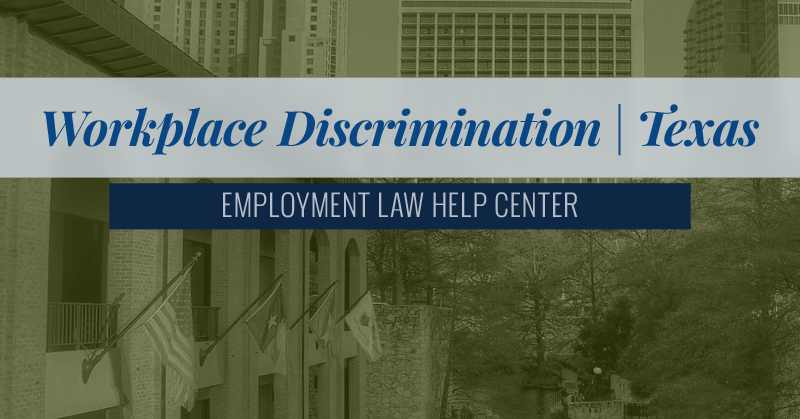Texas Workplace Discrimination Law
Texas upholds numerous state and federal laws prohibiting the discrimination of employees on the basis of a “protected characteristic,” including discrimination in regards to hiring, firing and treatment in the workplace. However, anti-discrimination laws are constantly changing, and it can be difficult to keep up with them. If you believe you have been discriminated against at work because of your religion, national origin, disability, age, or another protected characteristic, contact a reputable employment law attorney in Texas today. You may have grounds to file a workplace discrimination claim against your employer, in order to pursue financial compensation for any loss of wages and employer-provided benefits you incurred as a result of the discrimination.

Texas Laws Against Workplace Discrimination
The Texas Labor Code follows the federal standards established under the Civil Rights Act of 1964, and various other anti-discrimination laws that require the fair and ethical treatment of employees in the workplace. Under Texas labor law, an employer in Texas commits an unlawful employment practice if, because of color, race, religion, disability (a physical or mental condition that does not impair the individual’s ability to reasonably perform a job), national origin, sex (including pregnancy), or age (40 years or older), the employer:
- Fails or refuses to hire an individual
- Discharges an individual
- Discriminates in any other manner against an individual in terms of compensation or the conditions or privileges of employment (i.e. paying a woman less than a man for the same work)
- Limits, segregates or classifies an employee or employment applicant in a manner that would deprive an individual of any employment opportunity, or otherwise adversely affect the status of an employee
Types of Workplace Discrimination
There are a number of different types of workplace discrimination that may adversely affect employees in Texas, and there are laws in place that prohibit employers from engaging in discriminatory practices that have a disproportionate adverse impact on members of a protected class, or that violate the employee’s contract or go against public policy. The following are some common types of discrimination that may occur in the workplace:
- Retaliatory discrimination – Retaliating or discriminating against an employee who opposes a discriminatory practice, files a complaint, makes or files a charge, or testifies or participates in any manner in an investigation, proceeding or hearing.
- Sexual harassment – Unwelcome sexual advances, requests for sexual favors, or any other physical or verbal conduct of a sexual nature, if submission to the advance, request or conduct is made a term or condition of the individual’s employment.
- Hostile work environment harassment – Sexual harassment that is so severe or pervasive that it creates a work environment that is considered hostile or abusive.
- Aiding or abetting discrimination – An employer aids, abets, incites or coerces a person to engage in a discriminatory practice in the workplace.
Contact a Texas Workplace Discrimination Lawyer Today
Anti-discrimination laws in Texas provide the framework for the ethical and moral treatment of employees across the state, protect the rights of employees who belong to protected classes, and allow for civil remedies against employers who discriminate against employees on the basis of a protected characteristic, such as age, sex, religion or color. If you believe you have been the victim of workplace discrimination in Texas, don’t hesitate to seek legal guidance. An experienced employment law attorney can ensure that your legal rights are protected, and help you navigate the complicated process of filing a workplace discrimination claim against your employer. A successful workplace discrimination claim can result in favorable remedies for the employee, possibly including recovering back pay and being reinstated to his or her position at work.





